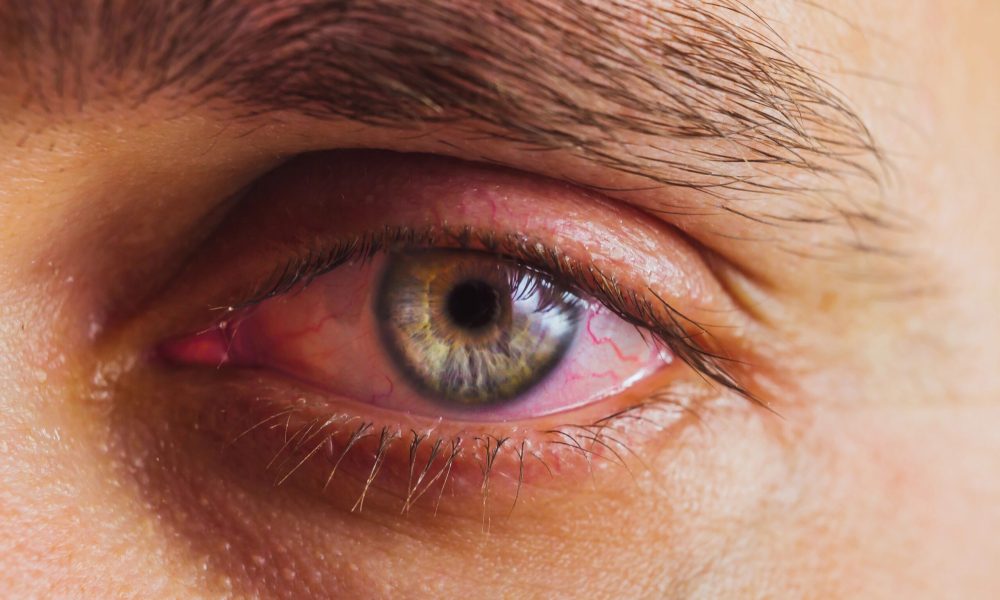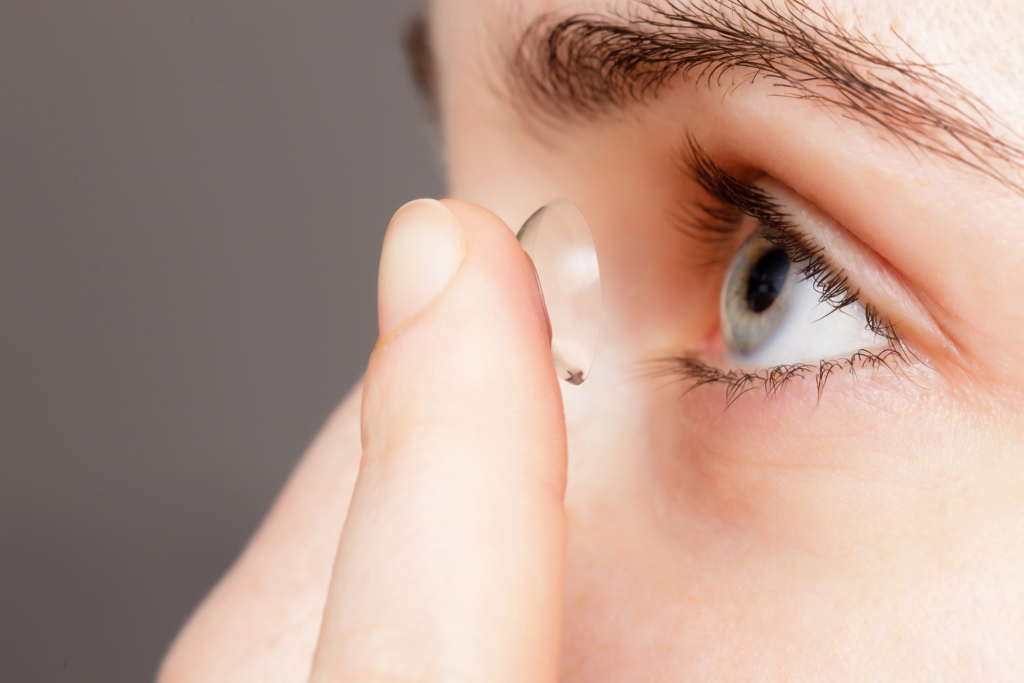If you’ve ever experienced sore, red, or irritated eyes, you’re not alone. Sore eyes can be caused by a variety of factors, ranging from infections to allergies. One of the most common questions people ask when dealing with this condition is, “Are sore eyes contagious?” The answer depends on the cause.
In this article, we’ll break down what causes sore eyes, the symptoms to watch for, and whether or not sore eyes are contagious. With the help of your eye doctor, understanding and treating sore eyes can be simple and effective. Whether it’s a minor irritation or a contagious infection, early treatment can prevent complications and help you get back to seeing clearly.
What Causes Sore Eyes?
Sore eyes can result from a variety of causes, ranging from mild irritants to serious infections. Understanding the root cause is crucial in determining whether the condition is contagious and how to treat it effectively. Here are some of the most common causes of sore eyes:
Viral Infections
One of the most frequent causes of contagious sore eyes is viral conjunctivitis, often referred to as pink eye. This type of infection spreads easily through direct contact or contaminated surfaces, making it highly contagious.
Bacterial Infections
Bacterial conjunctivitis is another contagious form of sore eyes. This infection is typically caused by bacteria entering the eye, often through contact with unclean hands or objects. It’s common in children, and sore eyes treatment for kids often involves antibiotic eye drops.
Allergies
Non-contagious sore eyes are often caused by allergies. Pollen, dust, pet dander, and other allergens can irritate the eyes, leading to redness, itching, and discomfort. Allergic sore eyes are not contagious, but they can be uncomfortable.
Irritants
Smoke, pollution, and chemicals can also cause non-contagious sore eyes. Exposure to these irritants can result in redness, dryness, and irritation, but they do not pose a risk of spreading to others.
Identifying the cause of sore eyes is the first step in determining whether they’re contagious and finding the right treatment. Your eye doctor can help diagnose the condition and recommend the appropriate treatment for sore eyes.
Are Sore Eyes Contagious?
The question on everyone’s mind: “Are sore eyes contagious?” The answer depends on the underlying cause. Some forms of sore eyes are highly contagious, while others are not.
Contagious Sore Eyes
Viral and bacterial conjunctivitis are the most common types of contagious sore eyes. These infections spread easily through direct contact, such as touching your eyes and then touching surfaces or shaking hands. Viral infections like pink eye can be especially contagious, making it important to practice good hygiene and avoid sharing personal items like towels or makeup.
Non-Contagious Sore Eyes
If your sore eyes are caused by allergies or irritants (such as smoke or dust), they are not contagious. While these forms of sore eyes can cause redness and discomfort, they do not spread to others.
Knowing whether your sore eyes are contagious can help you prevent the spread of infection. If you suspect that you have a viral or bacterial infection, it’s important to seek treatment from an eye doctor as soon as possible. Early diagnosis and treatment for sore eyes can prevent the condition from worsening or spreading to others.
Symptoms of Contagious vs. Non-Contagious Sore Eyes
Understanding the difference in symptoms can help you identify whether your sore eyes are contagious or not. While many symptoms overlap, certain signs can point to a viral or bacterial infection, which could spread to others.
Contagious Sore Eyes Symptoms
- Redness and swelling in the white part of the eye
- Watery or thick discharge (often yellow or green)
- Crusting around the eyelids, especially after sleep
- Itching or burning sensation
- Increased sensitivity to light
- Symptoms often begin in one eye and can spread to the other if not treated.
Non-Contagious Sore Eyes Symptoms
- Redness and irritation primarily from allergens or irritants
- Itchy eyes, often due to allergies
- Dryness or gritty feeling in the eyes
- Watery eyes, usually caused by environmental irritants like smoke or dust
- Symptoms are often present in both eyes simultaneously
If you’re experiencing symptoms of contagious sore eyes, it’s important to see an eye doctor for a proper diagnosis and treatment for sore eyes. Early intervention can help prevent the condition from spreading and ease discomfort.
How to Prevent the Spread of Sore Eyes
If your sore eyes are caused by a contagious infection, such as viral or bacterial conjunctivitis, it’s important to take steps to prevent spreading it to others. Here are some key preventive measures:
Wash Your Hands Frequently
Wash your hands with soap and water, especially after touching your eyes. This reduces the chances of spreading the infection to surfaces or other people.
Avoid Touching Your Eyes
Try not to touch or rub your eyes, as this can spread the infection from one eye to the other or to others around you.
Don’t Share Personal Items
Avoid sharing towels, pillowcases, makeup, or any personal items that come into contact with your face or eyes. This is a common way viral or bacterial infections can spread.
Disinfect Surfaces
Regularly disinfect commonly touched surfaces such as doorknobs, countertops, and bathroom items to prevent the spread of germs.
Stay Home
If your sore eyes are contagious, it’s best to avoid going to work, school, or public places until your eye doctor confirms it’s safe to return.
Taking these steps can help stop the spread of contagious sore eyes and protect those around you. If you’re unsure whether your sore eyes are contagious, it’s best to consult an eye doctor for proper diagnosis and advice.
Treating Sore Eyes: Contagious vs. Non-Contagious
The treatment for sore eyes depends on the underlying cause and whether it’s contagious. Here’s how you can manage both types of sore eyes:
Treatment for Contagious Sore Eyes
Viral Conjunctivitis
There’s usually no specific treatment for viral infections like pink eye, as they often clear up on their own within a week or two. However, your eye doctor may recommend lubricating eye drops or cool compresses to relieve discomfort.
Bacterial Conjunctivitis
Bacterial infections are typically treated with antibiotic eye drops or ointments. For sore eyes in kids, it’s important to ensure they complete the full course of antibiotics to prevent the infection from returning.
Follow your doctor’s advice on how long to stay home to avoid spreading the infection to others.
Treatment for Non-Contagious Sore Eyes
Allergies
Allergy-related sore eyes can be managed with antihistamine eye drops, prescription medications, or avoiding known allergens.
Irritants
If your sore eyes are caused by exposure to irritants like smoke or dust, rinsing your eyes with saline solution or using artificial tears can help soothe irritation.
Your eye doctor can recommend specific treatments based on the severity of your symptoms.
Whether your sore eyes are contagious or not, early treatment is key to relieving discomfort and preventing further complications. If symptoms persist, make sure to visit your eye doctor for a proper diagnosis and personalized care.
FAQs
What causes a sore eye?
Sore eyes can be caused by viral or bacterial infections, allergies, irritants like smoke or dust, or eye strain from prolonged screen use. The exact cause determines whether it’s contagious.
How to make eye pain go away?
To relieve eye pain, you can use lubricating eye drops, apply a cool compress, or take over-the-counter pain relievers. If the pain persists, see an eye doctor for a thorough examination and treatment.
Can sore eyes be transmitted?
Yes, sore eyes caused by viral or bacterial infections, like conjunctivitis, can be transmitted through direct contact or contaminated surfaces. Practicing good hygiene can help prevent transmission.
How do you stop sore eyes from spreading?
To stop the spread of sore eyes, wash your hands frequently, avoid touching your eyes, and don’t share personal items like towels or makeup. Disinfect surfaces and stay home until the infection clears.
Are sore eyes airborne?
Sore eyes are generally not airborne. They are spread through direct contact with infected fluids, contaminated surfaces, or personal items, not through the air.
How do I fix my sore eyes?
The treatment depends on the cause. For infections, consult your eye doctor for medication. For allergens or irritants, use artificial tears or antihistamine eye drops to relieve symptoms.
Can ice cure sore eyes?
While ice cannot cure sore eyes, applying a cold compress can help reduce swelling and discomfort. It’s a soothing remedy but not a treatment for infections or underlying causes.
Sore eyes can be uncomfortable and, in some cases, highly contagious. Knowing the causes and symptoms of sore eyes is key to determining the right treatment and preventing the spread of infection. Whether your sore eyes are due to an allergy, infection, or irritant, early treatment and preventive care can make all the difference. Don’t ignore persistent symptoms—getting prompt care from an eye doctor can help you recover faster and protect those around you from contagious conditions.
If you’re experiencing sore eyes or any discomfort in your vision, it’s time to take action. Schedule an appointment with Eye Pros today for a comprehensive eye exam and personalized treatment plan. Whether it’s a minor irritation or a contagious infection, our expert eye doctors are here to help you get relief and keep your eyes healthy. Don’t wait—book your eye exam now and take the first step toward clear, comfortable vision.





